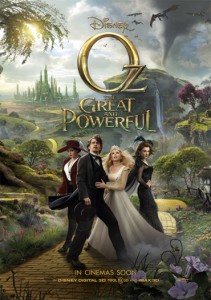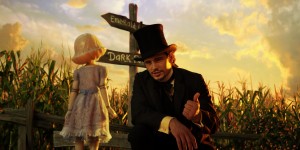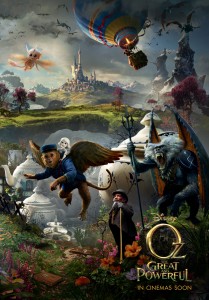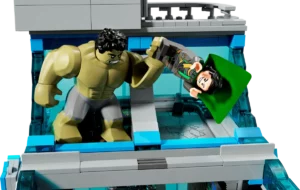
The idea of a prequel to The Wizard of Oz isn’t a new one with Wicked already a huge success but we’ve not seen one focus so completely on the wizard before. It makes sense too, given that the wizard is so central to the plot of the original movie. Therefore, with Oz The Great And Powerful, Sam Raimi and scriptwriters Mitchell Kapner and David Lindsay-Abaire tell us the story of the wizard, his initial journey to Oz and wrap the origin of the Wicked Witch up in the plot for good measure.
Sam Raimi really is starting to look like a director with no front to him, a man who leaves everything on the field. If he’s happy, then you get crash zooms and visual jokes and the sort of frantic cinematic wit that has made his career ever since Evil Dead.
When he’s not happy, you get Spider-Man 3.
It’s a pleasure to report then that Oz, The Great and Powerful is crammed full of the sort of visual mania you want to see from Raimi. Even better, he clearly adopts the cinematic grammar of the time a little, opening on a boxed in black and white sequence in Kansas before expanding the frame out when we arrive in Oz, showcasing a glorious pseudo-puppet show set of opening credits and cramming the movie with moments of glorious cinematic eccentricity and some wonderfully black humour, especially the China Girl’s incredibly large knife.
The film is an absolute pleasure to watch, and the design is frankly astonishing. The moment where the soundtrack is played by musical plants the Wizard is passing is wonderful, as are the crystalline plants seen later, the Emerald City itself and the genuinely disturbing shattered remnants of Chinatown. The skewed perspective that L.Frank Baum’s original novels had is clearly something Raimi can and does connect with to tremendous effect.
The script also works well, combining a relatively standard Coming of Age plot for the Wizard with an ending which is essentially an extended love letter to theatrical magic. This is a particularly nice nod to the original movie, and also a completely fitting workaround for how you can have the traditional ‘boss fight’ at the end of the movie whilst still maintaining Oz’s inherent pacifism. The Wizard, who in the real world is a magician, uses his experience to con not only the witches but the people of Oz into thinking he’s something other than mortal. He becomes exactly what he wants to be; a great man, and the only price he has to pay is anyone outside his circle of friends ever seeing him again. A hero’s journey ending with a hero’s price and Oz newly decorated and ready for the arrival of a certain young girl in a few years’ time. It’s a smart, coherently plotted script that hits every beat and plugs seamlessly into the original. There’s just one problem;
James Franco.

OZ THE GREAT AND POWERFUL
Rating: PG UK Release Date: 8 March 2013
US Relase Date: 8 March 2013
Formats: 3D and 2D
Unfortunately, none of it works. At all. The Wizard is constantly the dimmest, least likeable, loudest character in the room and after a while you just get sick of looking at him. Johnny Depp or Robert Downey Junior, originally attached to play the role, would have brought that unobtainable combination of humour, cowardice and arrogance to the role they both excel at. Franco just brings the cowardice and arrogance and it kills very nearly every scene he has stone dead. The Wizard’s a dick, it’s really that simple and when his redemption comes you’re so used to seeing him gurn and preen and wait for applause you’re waiting for it again. I’ve honestly never seen an otherwise sound movie with such a horrifically broken leading performance in it and the result is actually kind of fascinating. There’s an empty space at the middle of the movie, the smoke billowing, the curtain closed but no one behind it. As a result, you can’t help but look around at the other cast and, thankfully, they’re more than up to the task. Mila Kunis as Theodora feels a little stilted at times but her transformation is genuinely chilling and for a relatively simple set of prosthetics renders her all but unrecognisable. Likewise, Rachel Weisz as Evanora is fantastic, every inch the plausible big sister until she turns and her eyes go dead. She’s arguably the most interesting of the three and it’s a shame she doesn’t get a little more screen time. Michelle Williams initially looks like she’s fallen into the same trap as Franco, her whisper-voiced Glinda the Good Witch seeming as ephemeral as the soap bubble her kingdom is protected by. However, as the movie goes on she reveals a playful, mischievous strength to the character and even provides Franco, and the Wizard, with their single good moment when she calmly explains that she knows he’s a con man but believes in him anyway.
However, the stand outs in the cast are, oddly, both voiceover artists. Zach Braff, as Oz’s assistant in the real world and Finlay, a talking monkey who swears a life debt to him in Oz, is fantastic and holds together every single one of Franco’s scenes. He’s laconic and hysterical by turns, cheerfully off kilter and completely charming, taking a one note character and turning it into something rich and fun and interesting. Similarly Joey King, who appears as a paralyzed girl in the opening and a girl made of China, or China Girl, in Oz, does great work. It would be very easy for her to be one note once again but King brings a combination of slight mania and cheerful manipulation to the role that makes it work without ever seeming broad or once forgetting she’s a child who saw her entire village literally torn apart. If there’s an emotional heart to the movie it’s with these two and each of their scenes is a pleasure to watch, as is the excellent support work done by Bill Cobbs as the chief of the Tinkers of Oz and Tony Cox as Knuck the world’s grumpiest munchkin.

But there’s still Franco. Or rather, the lack thereof.
Make no mistake, Oz The Great and Powerful isn’t a bad film by any stretch. In fact it’s a very good one in a number of ways but it’s hollow, there’s absolutely no engagement with the central performance and no emotional connection at all. The Wizard smiles, screams, lies, panics, lies some more, seduces women and says ‘Zim ZALA BIM!’ roughly 800 times more than is funny or charming. I’m not even sure it’s Franco’s fault, I think he and Raimi may have aimed for a specific kind of performance and utterly, utterly failed to get near it.
Regardless, if you can get past that, and you really should, it’s a movie that’s definitely worth your time. In fact, the lousy central work is almost an incentive. After all, it’s even weirdly appropriate that for a film about the man behind the curtain, we should find no one there when we look.
Alasdair Stuart



